| Listing 1 - 10 of 16 | << page >> |
Sort by
|
Book
ISBN: 1317138848 1282295098 9786612295096 0754692876 9780754692874 0754616851 9780754616856 9780754616856 1315581167 Year: 2009 Publisher: Farnham, England Burlington, VT Ashgate
Abstract | Keywords | Export | Availability | Bookmark
 Loading...
Loading...Choose an application
- Reference Manager
- EndNote
- RefWorks (Direct export to RefWorks)
Evagrius of Pontus and Gregory of Nyssa have either been overlooked by philosophers and theologians in modern times, or overshadowed by their prominent friend and brother (respectively), Basil the Great. Yet they are major figures in the development of Christian thoughts in late antiquity and their works express a unique combination of desert and urban spiritualities in the lived and somewhat turbulent experience of an entire age. They provide a significant link between the great ancient thinkers of the past - Plato, Aristotle, the Stoics, Clement and others - and the birth and transmission of
Evagrius, --- Gregory, --- Ghirīghūriyūs, --- Grégoire, --- Gregor, --- Gregori, --- Gregorio, --- Grēgorios, --- Gregorius, --- Grigoli, --- Grigoriĭ, --- Grzegorz, --- Qiddīs Ghirīghūriyūs Usquf Nīṣṣ, --- Grigorije, --- Euagrios, --- Evagre, --- Evagriĭ, --- Evagrios, --- Evagrius Ponticus, --- Gregorius Nyssenus --- Gregor von Nyssa --- Gregorio di Nissa --- Gregorius van Nyssa --- Gregory of Nyssa --- Grégoire de Nysse
Book
ISBN: 128139873X 9786611398736 9047405544 9789047405542 Year: 2007 Publisher: Leiden Boston Brill
Abstract | Keywords | Export | Availability | Bookmark
 Loading...
Loading...Choose an application
- Reference Manager
- EndNote
- RefWorks (Direct export to RefWorks)
Gregory, --- Ghirīghūriyūs, --- Grégoire, --- Gregor, --- Gregori, --- Gregorio, --- Grēgorios, --- Gregorius, --- Grigoli, --- Grigoriĭ, --- Grzegorz, --- Qiddīs Ghirīghūriyūs Usquf Nīṣṣ, --- Grigorije, --- Gregorius Nyssenus --- Gregor von Nyssa --- Gregorio di Nissa --- Gregorius van Nyssa --- Gregory of Nyssa --- Grégoire de Nysse
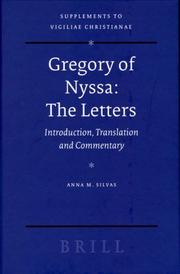
ISSN: 0920623X ISBN: 9004152903 9789004152908 9786611399931 1281399930 904741053X 9789047410539 9781281399939 6611399933 Year: 2007 Volume: 83 Publisher: Leiden: Brill,
Abstract | Keywords | Export | Availability | Bookmark
 Loading...
Loading...Choose an application
- Reference Manager
- EndNote
- RefWorks (Direct export to RefWorks)
This book gathers 37 letters of St Gregory of Nyssa (c. 335-394), translated into English, some for the first time, and equipped with up-to-date scholarly notes. It begins with a biography focusing on Gregory’s family background and young adulthood. A study of Gregory the letter writer follows, with a dateline of the letters. Three sub-collections of letters follow: 1. ‘Prelude’ comprising testimonia from Basil and Gregory Nazianzen, 2. ‘The Pasquali Collection’, the 30 letters established by G. Pasquali, 3. ‘Supplementary’, one letter always known as Gregory’s, five letters reassigned to Gregory by scholars, and a new one proposed by the author for reassignment. A specially commissioned icon, an original map, and two architectural sketches are included. This book will both stimulate veteran scholars in the Cappadocian Fathers and early Christianity, and serve English speaking lovers of the Fathers who do not have ready access to the sources in other languages.
Christian saints --- Gregory, --- -276 =75 GREGORIUS NAZIANZENUS --- Saints --- Canonization --- Correspondence. --- Griekse patrologie--GREGORIUS NAZIANZENUS --- 276 =75 GREGORIUS NAZIANZENUS --- Ghirīghūriyūs, --- Grégoire, --- Gregor, --- Gregori, --- Gregorio, --- Grēgorios, --- Gregorius, --- Grigoli, --- Grigoriĭ, --- Grzegorz, --- Qiddīs Ghirīghūriyūs Usquf Nīṣṣ, --- Grigorije, --- Gregorius Nyssenus --- Gregor von Nyssa --- Gregorio di Nissa --- Gregorius van Nyssa --- Gregory of Nyssa --- Grégoire de Nysse --- Christian saints - Turkey - Correspondence --- Gregory, - of Nyssa, Saint, - ca. 335-ca. 394 - Correspondence --- Gregory, - of Nyssa, Saint, - ca. 335-ca. 394
Book
ISSN: 0920623X ISBN: 9789004169654 9004169652 9786612949340 9004190694 1282949349 9789004190696 9781282949348 6612949341 Year: 2010 Volume: 99 Publisher: Leiden: Brill,
Abstract | Keywords | Export | Availability | Bookmark
 Loading...
Loading...Choose an application
- Reference Manager
- EndNote
- RefWorks (Direct export to RefWorks)
The Brill Dictionary of Gregory of Nyssa is the fruit of wide-ranging collaboration between experts in Philology, Philosophy, History and Theology. These scholars shared the desire to develop a comprehensive reference work that would help attract more people to the tudy of the 'Father of Fathers' and assist them in their work. Gregory of Nyssa's thought is at once quintessentially classic and modern, as it speaks directly to the contemporary reader. As interest in Gregory has increased along with the number of works devoted to him, the need for a comprehensive introduction and bibliographical reference work has arisen. In order to meet this need, more than forty scholars from various disciplines and perspectives have contributed to this work. In two hundred articles, the Brill Dictionary of Gregory of Nyssa provides a symphonic vision of the studies on Gregory of Nyssa and his thought.
Gregory, --- 276 =75 GREGORIUS NYSSENUS --- Griekse patrologie--GREGORIUS NYSSENUS --- Ghirīghūriyūs, --- Grégoire, --- Gregor, --- Gregori, --- Gregorio, --- Grēgorios, --- Gregorius, --- Grigoli, --- Grigoriĭ, --- Grzegorz, --- Qiddīs Ghirīghūriyūs Usquf Nīṣṣ, --- Grigorije, --- Gregorius Nyssenus --- Gregor von Nyssa --- Gregorio di Nissa --- Gregorius van Nyssa --- Gregory of Nyssa --- Grégoire de Nysse --- Gregorius ep. Nyssenus --- Gregory, - of Nyssa, Saint, - ca. 335-ca. 394 - Dictionaries --- Grigar̲i, --- Gregory, - of Nyssa, Saint, - ca. 335-ca. 394
Book
ISBN: 0253005086 9780253005083 9780253355942 025335594X 9780253222862 0253222869 025335594X 9780253355942 Year: 2011 Publisher: Bloomington, Ind. Indiana University Press
Abstract | Keywords | Export | Availability | Bookmark
 Loading...
Loading...Choose an application
- Reference Manager
- EndNote
- RefWorks (Direct export to RefWorks)
Negative theology. --- Phenomenological theology. --- Phenomenology --- Philosophical theology --- Dionysius, --- Gregory, --- Marion, Jean-Luc, --- Areopagita, Dionysius, --- Denis, --- Denys, --- Dionisie, --- Dionisiĭ, --- Ps. Dionysius, --- Sfântul Dionisie, --- Pseudo-Dionysius, --- Ghirīghūriyūs, --- Grégoire, --- Gregor, --- Gregori, --- Gregorio, --- Grēgorios, --- Gregorius, --- Grigoli, --- Grigoriĭ, --- Grzegorz, --- Qiddīs Ghirīghūriyūs Usquf Nīṣṣ, --- Grigorije, --- Gregorius Nyssenus --- Gregor von Nyssa --- Gregorio di Nissa --- Gregorius van Nyssa --- Gregory of Nyssa --- Grégoire de Nysse --- Marion, Jean-Luc --- Marion, J.-L.
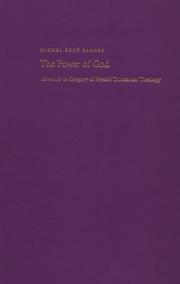
ISBN: 0813218527 9780813218526 0813209293 9780813209296 Year: 2001 Publisher: Washington, D.C. : Catholic University of America Press,
Abstract | Keywords | Export | Availability | Bookmark
 Loading...
Loading...Choose an application
- Reference Manager
- EndNote
- RefWorks (Direct export to RefWorks)
Dynamis (The Greek word) --- Power (Christian theology) --- Trinity --- Greek language --- Power (Theology) --- Christian sociology --- History of doctrines --- Etymology --- Gregory, --- Ghirīghūriyūs, --- Grégoire, --- Gregor, --- Gregori, --- Gregorio, --- Grēgorios, --- Gregorius, --- Grigoli, --- Grigoriĭ, --- Grzegorz, --- Qiddīs Ghirīghūriyūs Usquf Nīṣṣ, --- Grigorije, --- Gregorius Nyssenus --- Gregor von Nyssa --- Gregorio di Nissa --- Gregorius van Nyssa --- Gregory of Nyssa --- Grégoire de Nysse --- Trinity - History of doctrines - Early church, ca 30-600 --- Power (Christian theology) - History of doctrines - Early church, ca. 30-600.
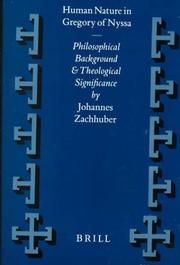
ISSN: 0920623X ISBN: 9004115307 9004274324 9789004115309 9789004274327 Year: 2000 Volume: 46 Publisher: Leiden: Brill,
Abstract | Keywords | Export | Availability | Bookmark
 Loading...
Loading...Choose an application
- Reference Manager
- EndNote
- RefWorks (Direct export to RefWorks)
This volume explores Gregory Of Nyssa's concept of human nature. It argues that the frequent use Gregory makes of phusis -terminology is not only a terminological predilection, but rather the key to the philosophical and theological foundations of his thought. Starting from an overview of the theological landscape in the early 360's the study first demonstrates the meaning and relevance of universal human nature as an analogy for the Trinity in Cappadocian theology. The second part explores Gregory's use of this same notion in his teaching on the divine economy. It is argued that Gregory takes this philosophical theory into the service of his own theology. Ultimately the book provides an example for the mutual interaction of philosophy and Christian theology in the fourth century.
Theological anthropology --- Christianity --- History of doctrines --- 276 =75 GREGORIUS NYSSENUS --- Man (Christian theology) --- -Man (Christian theology) --- Griekse patrologie--GREGORIUS NYSSENUS --- -Gregory of Nyssa, Saint --- -Contributions in Christian doctrine of man --- Gregory, --- -Griekse patrologie--GREGORIUS NYSSENUS --- Ghirīghūriyūs, --- Grégoire, --- Gregor, --- Gregori, --- Gregorio, --- Grēgorios, --- Gregorius, --- Grigoli, --- Grigoriĭ, --- Grzegorz, --- Qiddīs Ghirīghūriyūs Usquf Nīṣṣ, --- Grigorije, --- Gregorius Nyssenus --- Gregor von Nyssa --- Gregorio di Nissa --- Gregorius van Nyssa --- Gregory of Nyssa --- Grégoire de Nysse --- Contributions in Christian doctrine of man. --- Humanities --- The Early Church --- Theological anthropology - Christianity - History of doctrines - Early church, ca 30-600.
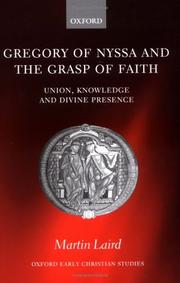
ISBN: 0199267995 0191601578 1281190772 9786611190774 1435621948 0199229155 019153322X 9780191533228 9780199267996 Year: 2004 Volume: *8 Publisher: Oxford: Oxford university press,
Abstract | Keywords | Export | Availability | Bookmark
 Loading...
Loading...Choose an application
- Reference Manager
- EndNote
- RefWorks (Direct export to RefWorks)
Scholars of Gregory of Nyssa have long acknowledged the centrality of faith in his theory of divine union. This study elucidates important auxiliary themes that accrue to Gregory's notion of faith as a faculty of apophatic union with God.
Faith --- History of doctrines --- Gregory, --- 276 =75 GREGORIUS NYSSENUS --- Griekse patrologie--GREGORIUS NYSSENUS --- Religious belief --- Theological belief --- Belief and doubt --- Religion --- Salvation --- Theological virtues --- Trust in God --- Ghirīghūriyūs, --- Grégoire, --- Gregor, --- Gregori, --- Gregorio, --- Grēgorios, --- Gregorius, --- Grigoli, --- Grigoriĭ, --- Grzegorz, --- Qiddīs Ghirīghūriyūs Usquf Nīṣṣ, --- Grigorije, --- Theology, Doctrinal. --- Christian doctrines --- Christianity --- Doctrinal theology --- Doctrines, Christian --- Dogmatic theology --- Fundamental theology --- Systematic theology --- Theology, Dogmatic --- Theology, Systematic --- Theology --- Doctrines --- Gregorius Nyssenus --- Gregor von Nyssa --- Gregorio di Nissa --- Gregorius van Nyssa --- Gregory of Nyssa --- Grégoire de Nysse --- Faith - History of doctrines - Early church, ca 30-600 --- Gregory, - of Nyssa, Saint, - approximately 335-approximately 394
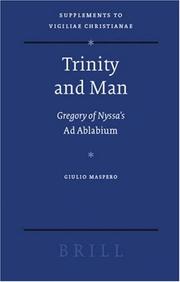
ISBN: 9789004158726 9004158723 9786611921514 1281921513 9047420799 9789047420798 9781281921512 Year: 2007 Volume: 86 Publisher: Leiden: Brill,
Abstract | Keywords | Export | Availability | Bookmark
 Loading...
Loading...Choose an application
- Reference Manager
- EndNote
- RefWorks (Direct export to RefWorks)
Why is it that when we speak of three human subjects, we speak of a unique nature, but we say that they are “three men”, while when we speak of the Trinity, we speak again of a unique nature, but we say that they are “one God”? Gregory of Nyssa gives the answer in his Ad Ablabium , work that lately is the focus of a discussion about the interpretation of Gregory’s thought and the social analogy of the Trinity. Trinity and Man is the first monograph devoted entirely to this tract and contributes to the debate, offering a commentary to the text, which follows the development of the Nyssian arguments and frames them in the context of Gregory’s theological grammar.
Trinity --- God --- Negative theology --- History of doctrines --- Knowableness --- History of doctrines. --- 276 =75 GREGORIUS NYSSENUS --- 231.01 --- 231.01 Drieëenheid. Drievuldigheid --- Drieëenheid. Drievuldigheid --- Griekse patrologie--GREGORIUS NYSSENUS --- Metaphysics --- Misotheism --- Monotheism --- Religion --- Theism --- Knowableness&delete& --- Gregory, --- Ghirīghūriyūs, --- Grégoire, --- Gregor, --- Gregori, --- Gregorio, --- Grēgorios, --- Gregorius, --- Grigoli, --- Grigoriĭ, --- Grzegorz, --- Qiddīs Ghirīghūriyūs Usquf Nīṣṣ, --- Grigorije, --- Gregorius Nyssenus --- Gregor von Nyssa --- Gregorio di Nissa --- Gregorius van Nyssa --- Gregory of Nyssa --- Grégoire de Nysse --- Trinity - History of doctrines - Early church, ca 30-600 --- God - Knowableness - History of doctrines. --- Negative theology - History of doctrines.
Book
ISBN: 9781472572325 1472572327 9781472572349 1472572343 9781474219891 1474219896 9781472572332 1472572335 133621273X 1350007935 9781350007932 Year: 2015 Publisher: London [etc.] Bloomsbury Academic
Abstract | Keywords | Export | Availability | Bookmark
 Loading...
Loading...Choose an application
- Reference Manager
- EndNote
- RefWorks (Direct export to RefWorks)
Whilst aesthetics as a discipline did not exist before the modern age, ancient philosophers give many insights about beauty and art. In Late Antiquity Plotinus confronted the problem of beauty and the value of the arts. Plotinus' reflections have an important role in the development of the concept of the value of artistic imagination during the Renaissance and the Romantic era, but he also influenced the artistic taste of his time. Aesthetic Themes in Pagan and Christian Neoplatonism reconstructs the aesthetic philosophical views of Late Antiquity, and their relation to artistic production of the time. By examining the resonance of Plotinus' thought with contemporary artists and with Christian thinkers, including Gregory of Nyssa, the book demonstrates the importance of Plotinus' treatise On Beauty for the development of late ancient aesthetics. The Cappadocian fathers' interest in Plotinus is explored, as well as the consequent legacy of the pagan thinker's philosophy within Christian thought, such as the concept of beauty and the narration of the contemplative experience. Uniquely utilising philological and philosophical insight, as well as exploring both pagan and Christian philosophy, Aesthetic Themes in Pagan and Christian Neoplatonism represents the first comprehensive synthesis of aesthetic thought of Late Antiquity
Philosophy, Ancient. --- Neoplatonism. --- Aesthetics. --- Beautiful, The --- Beauty --- Esthetics --- Taste (Aesthetics) --- Philosophy --- Art --- Criticism --- Literature --- Proportion --- Symmetry --- Alexandrian school --- Church history --- Hellenism --- Philosophy, Ancient --- Platonists --- Theosophy --- Ancient philosophy --- Greek philosophy --- Philosophy, Greek --- Philosophy, Roman --- Roman philosophy --- Psychology --- Plotinus. --- Gregory, --- Ghirīghūriyūs, --- Grégoire, --- Gregor, --- Gregori, --- Gregorio, --- Grēgorios, --- Gregorius, --- Grigoli, --- Grigoriĭ, --- Grzegorz, --- Qiddīs Ghirīghūriyūs Usquf Nīṣṣ, --- Grigorije, --- Gregorius Nyssenus --- Gregor von Nyssa --- Gregorio di Nissa --- Gregorius van Nyssa --- Gregory of Nyssa --- Grégoire de Nysse --- Boluoding --- Iflūṭīn --- Plotin --- Plotino --- Plōtinos --- Plotinus, --- Plotyn --- Πλωτι̂νος --- פלוטינוס --- أفلوطين --- Radio broadcasting Aesthetics --- Aesthetics
| Listing 1 - 10 of 16 | << page >> |
Sort by
|

 Search
Search Feedback
Feedback About UniCat
About UniCat  Help
Help News
News